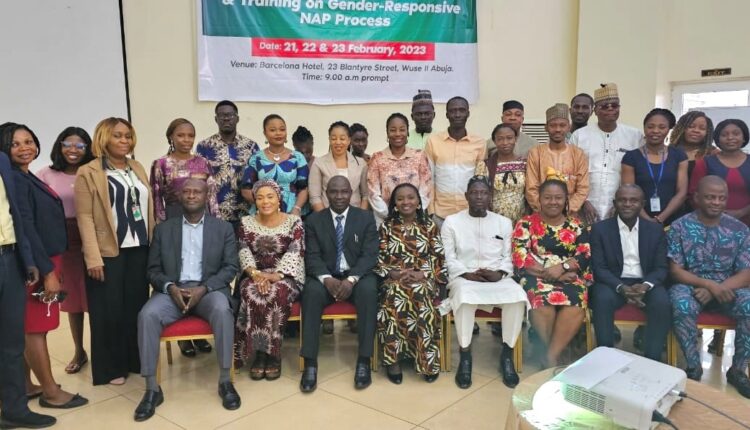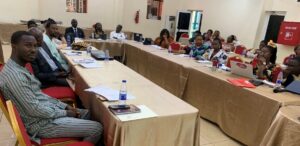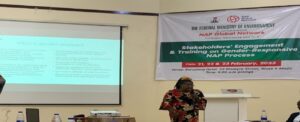
Countries are increasingly using their National Adaptation Plan (NAP) processes to realize gender-responsive climate action and act on the Gender Action Plan (GAP) under the United Nations Framework Convention on Climate Change.
In recognition of the roles of Stakeholders in the advocacy for climate justice in Nigeria, the Federal Ministry Environment Department of Climate Change (DCC) in Collaboration with the Global NAP Process organized and convened a one-day consultative Training Workshop with women, girls and the people with disability (PWDs) to analyze and foster the inclusion of gender-responsiveness to NAP process. This was held on Tuesday February 22nd, 2023 at Wuse II Abuja, Nigeria.
The major goal of the event is to enhance the capacity of relevant stakeholders on the importance of and how to mainstream gender considerations in to NAP process in particular and climate change actions in general at the National, State and Local levels in Nigeria.
The establishment in 2010 under the United Nations Framework Convention on Climate Change (UNFCCC), NAP processes enable countries to build the resilience of their ecosystems, economies, and communities to the impacts of climate change.
Led by national governments, the NAP process is intended to be participatory, gender responsive, and inclusive of the most vulnerable groups and communities. This approach presents an opportunity to facilitate dialogue between adaptation decision-makers and the people most affected by the impacts of a changing climate.
In most countries especially in Nigeria, government actors recognize that it is important for effective adaptation planning to be informed by a diversity of voices, particularly those of women, who are often underrepresented in decision making.
Alhaji Dan Galidima Musa giving the opening remarks on behalf of the Director of DCC, Dr (Mrs) Iniobong Abiola-Awe, mentioned that the NAP Global Network was established in 2014 at the 20th session of the Conference of Parties’ (COP) with a focus to support developing countries to advance their gender inclusion processes to help accelerate climate change adaptation efforts around the world.
Following her welcome remarks, Mrs Victoria Gyang Pwol Deputy Director and Head of Green House Gas Inventory Division DCC said:
“It is a great opportunity to carry out this NAP training process in Nigeria as Climate change has become a critical issue, both for its global importance and threats to Nigeria and its people. For instance, we have the desertification process advancing southward and potential submergence of stretch of coastline along the Atlantic Ocean.”

“As is usual, there will be some changes in climate that cannot be avoided due to past and inevitable future global emissions, but the detrimental effects can be avoided if we can reduce greenhouse gases emission to an acceptable level,” she added.
NAP Project Coordinator, Mr A. Kayode, gave a brief journey so far of the Nigeria NAP process. In his presentation he stated that:
”Nigeria obtained a readiness and preparatory Support from the Green Climate Fund (GCF) to advance its NAP process through a project Tittle “Strengthening Nigeria’s Capacity to Advance the NAP process,” he said.
“The objective of the project is to strengthen the capacity of Nigeria’s government at all levels to implement a NAP process including planning and budgeting for adaptation towards building adaptive capacity and resilience in Nigeria while also facilitating the integration of climate change into new and existing policies, plans and strategies,” he concluded.
Obinna Anyawu a Junior Member of the House of Representatives added that: “women should be sensitized on the need of their full participation in the house of Rep at the national level where key decisions are being made”.
Dr Elizabeth Jeiyol, Gender Thematic Lead at Climate and Sustainable Development Network (CSDevNet) and founder of Gender and Environmental Risk Reduction Initiative (GERRI) stated that gender analysis is important to inform a gender-responsive NAP process. In her words: “Women farm a lot to produce food but they don’t get a chance to own a piece of Land especially in the rural communities”.

She further gave some benefits of gender analysis which leads to effective policies and programs which leads efficient use of resources, equal access to opportunities and resources leads to promoting economic development and helps to find the best strategies and solutions to address the different needs and dynamics of men and women living in poverty. Also to build capacity for resilience equally and to ensure the equal participation of a range of people in decision-making and implementation.
She added that the importance of gender-sensitive approach in adaptation to climate is that “women are seen agent of change at different levels of the adaptation process and also women often deep understanding for their immediate environment, their experience in managing natural resources (Water, forest, biodiversity, livestock and soil) and their involvement in climate sensitive work, such as in the areas of farming, forestry and fishery, make them valuable adaptation decision-makers and key adaptation implementers.
Speaking from the event, Mariam Idris, Programme Assistant at CSDevNet said participation in the workshop would assist CSDevNet in achieving her goal of mainstreaming gender inclusion in policies and National Planning Adaptation process with an increase participation of women, girls and PWDs in Nigeria.
“Women over the years have been marginalised especially in decision making process at the National level. The relevance of this event is to build resilient CSOs, communities and relevant stakeholders to increase their advocacy, engagement and participation in consultative workshop such as this,” she added.
